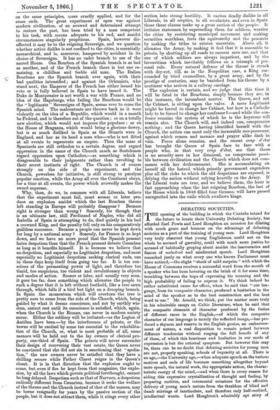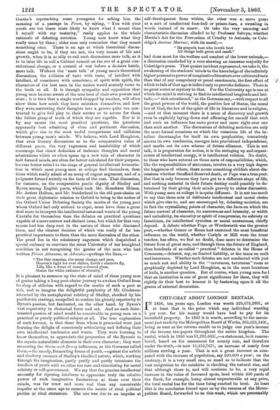DEBATING SOCIETIES.
THE opening of the building in which the Cantabs intend for the future to locate their University Debating Society, has
afforded Earl Powis and Lord Houghton an occasion for dilating with much grace and humour on the advantage of debating societies as a part of the training of young men. Lord Houghton very truly observed that young Englishmen could not on the whole be accused of garrulity, could with much more justice be accused of habitually groping about amidst the inaccuracies and fiascos of maladroit and misdirected speech. Lord Houghton. remarked justly on what every one who knows Parliament must have noticed,—the slight "shock of mild surprise" with which the House of Commons receives a successful word from the mouth of a speaker who has been hovering on the brink of it for some time, trembling between the hope of expressing his meaning and the high probability of failing to express it. We think indeed he rather substituted cause for effect, when he said that "our lan- guage, from its composite character, produced a hesitation in the mind of the speaker as to the best construction and the best word to use." Mr. Arnold, we think, put the matter more truly in his admirable essays on Celtic literature, when he said that the composite elements of character produced by the fusion of different races in the English,—of which the composite character of our language is merely the reflected image,—has pro- duced a shyness and reserve in the English genius, an embarrass- ment of nature, a real disposition to remain poised between different tendencies without reaping the full benefit of any of them, of which this heaviness and hesitation in our mode of expression is but the external symptom. But however this may be, there can be no doubt that debating societies for young men are not, properly speaking, schools of loquacity at all. There is an age,—the University age,—when adequate speech on the various motives and ends of life becomes something altogether beyond mere speech, the natural work, the appropriate action, the charac- teristic energy of the mind,—and when there is every reason for aiding this expressive crystallization of thought and feeling, by preparing motives, and ceremonial occasions for the effective delivery of young men's nature from the thraldom of blind and dumb stirrings of inarticulate, and therefore only half-realized, intellectual wants. Lord Houghton's admirably apt story of
Goethe's reproaching some youngster for asking, him the meaning of a passage in Faust, by dying, "You. with your youth are ten times more likely to know what I meant than I myself with, my maturity," really applies to the whole rationale of debating societies. Young men know what they really mean by them ; older men only remember that they meant something once. There is an age at which theoretical discus- sions ought to be, if they are not, the very means of life and growth, when it is as silly to call such discussions mere talk, as it is in later life to call a Cabinet council on the eve of a great con- stitutional change, or a council of war before a decisive battle, mere talk. Without the 'mere talk ' of young men's theoretical discussions, the collision of taste with taste, of intellect with intellect, of conscience with conscience, of spirit with spirit, the • characters of the best men in the nation would scarcely come to the birth at all. It is through sympathy and opposition that young men become aware of the true bent of their own powers and aims ; it is then that a single word dropped by another, will often show them how much they have mistaken themselves, and how they were narrowing their thoughts into a groove quite to con- tracted to give full play to their nature or to secure for them the fullest grasp of truth of which they are capable. Nor is it by any means the most practical questions, the questions apparently best admitting of close and pertinent discussion, which give rise to the most useful comparisons and collisions between young men's minds. We believe, with Lord Houghton, that even literary discussions as to the comparative value of different posts, the very, vagueness and insolubility of which encourage that closer definition of. inchoate thoughts and moral admirations which so often opens up a new vein of character in half formed minds, are often far better calculated for their purpose, because better suited to the stage of general intellectual fermenta- tion in which most young men at college find themselves, than those which really admit of an array of cogent argument, and of a judgment formed strictly on the facts of the case. That discussion, for instance, on the comparative poetic dignity. of Shelley and Byron among English poets, which took Mr. Alonekton Mr. Arthur Hallam, and Mr. Sunderland in the old post-chaise on their great diplomatic mission to Oxford to bring.to the notion of the Oxford Union Debating Society the merits of the young poet whom Oxford had only noticed to expel, must have done a great deal more to interpret the intellectual tastes and wants of the young Cantabs for themselves than the debates on practical questions capable of a more narrow and distinct issue, but which for that very reason had less deep root in the nature of those who discussed them, and the clearest decision of which was really of far less- practical importance to them than the mere discussion of the other. The proof lies in the missionary eagerness which despatched a special embassy to convince the sister University of her benighted condition in not recognizing the genius of the man who had written Prince Athanase, or Adonais,—perhaps the lines,— " The One remains, the many change and pass, Heaven's light for ever shines, Earth's shadows fly, Life, like a dome of many-coloured glass, Stains the white radiance of eternity."
It is pleasant to summon up the state of mind of these young men of genius taking a long post-chaise journey to awaken Oxford from its sleep of oblivion with regard to the merits of such a poet as this, and to imagine the delightful perplexity of Mr. Gladstone attracted by the metaphysical subtlety of Shelley, shocked by his pantheistic cravings, compelled to confess his ghostly superiority to Byron's passion, but fascinated, on the other hand, by Byron's -vast superiority in rhetorical force and art. And no such disin- terested passion of mind would be conceivable in young men on a practical or purely political subject at all. The true explanation of such fervour, is that those from whom it proceeded were just learning the delight of consciously articulating and defining their own intellectual tendencies and wants. They were learning to know themselves, to appreciate the proportion of the Byronic to the mystic-naturalistic elements in their own character ; they were measuring the Sturin-und-Drang influences, as the Germans called them,—the moody, fermenting forces of youth,—against-the subtle and shadowy essences of Shelley's idealized nature, which, working through the imagination, partly purify and partly intoxicate the intellect of youth with an ether too rare and stimulating for moral sobriety or self-government. We say that the genuine intellectual necessity for ripening intellects to appreciate truly the relative power of such imaginative fascinations as those over their minds, was far truer and more real than any conceivable impulse at the same age to measure the merits of rival political parties or rival statesmen. The one was due to an impulse at self-development from within, the other- was ar mere gams at a sort of intellectual foot-ball or prison-bars, a wrestling in words instead, of in sinew., Or take the very amusing and characteristic discussion alluded to by Professor Solwyni, whether Martin's Act for the Prevention of Cruelty to Animals,. or Cole- ridge's Ancient Mariner, withLits moral,— " Ho prayeth best who leveth best
Akthin,gw both great and small."
had done most for the welfare and comfort of the- lower-nnimals,— a discussion concluded by a vote-showing an immense majority-for Coleridge's poem. That quaint incident represented, we take it,.the awakening of the students' minds' to the knowledge of the infinitely higher persuasive power of imaginative literature over c ultivated men than that of any compulsory or penal enactments, the it effect of which to lads of that age is indeed only to provoke defiance. There is no great secret or mystery in that. For the University age is one at which the mind is striving to find its intellectual longitude and lati- tude,—" sich orientirend," as the Germans say,—with respect to all the great powers of the world, the positive law of States, the moral law of God, the law of the spirit of life in literature and in religion, —and at that moment there is a sense of discovery and growth even in explicitly laying down and affirming for oneself that such and such an influence has more power and more right over one than such another. The discussions of debating societies are only the more formal occasions on which the conscious life of the in- tellect disentangles for itself its own, perplexities, tentatively asserts its own tendencies, emerges into provisional independence, and marks out its own scheme of future alliances. This is not talk, it is preparation for action,. it is the stringing up and organi- zation of intellectual energy, it is intellectual volition. No doubt, to those who have entered on those sorts of responsibilities, which, like the responsibilities of statesmen, involve in a very high degree the happiness of others, there seems something childish about dis- cussions whether Strafford deserved death, or Pope wasa true poet. But that is only because they have got to a different stage of dife, and nothing material in their future destiny could possibly be de- termined by their giving their minds gravely to either- discussion. With young,men at college it is quite different. It is not too much to say that those acts of deliberate intellectual, and-moral- choice which give rise to, and are encouraged by, debating- societies; are in fact the crystallizing points of character, the facto on which the future current of character, its narrownesoand intensity, or width and catholicity,. itusincerity or spirit of compromise,- its sobriety or fanaticism, its intellectual- cynicism or 'moral -earnestness, chiefly depend. A debate whether Pope or Worclawortly was the greater poet, —whether Greece or Rome -had exercised the most beneficial influence on the world, whether Carlyle or Mill were the truer teacher, has often, we feel no doubt, done more to determine the future lives of great men, and through them the future of England, than hundreds of so-called " practical " debates in the House of Commons,—debates, say, on limited liability, or the taxes on malt and insurance. Whether such debates are not conducted- with just as much zest and ability in the "cavernous, tavernoua" room so graphically depicted by Lord Houghton, as in the most luxurious of halls, is another question. But of course, when young men-feel that an institution is one of great significance for them, they, will rightly do their best to honour it by bestowing upon it all the graces of external decoration.































 Previous page
Previous page